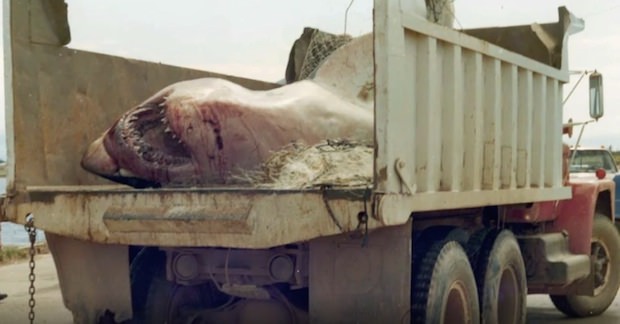New research suggests that legendary white shark–at 17-plus feet one of the largest ever measured–was only 20 years old and ‘still had a lot of growing to do’
New studies in the U.S. and Canada that examined the P.E.I. shark’s bones, along with others, show that sharks grow more slowly and mature much later than previously thought. The research gives precise dating of the age of sharks by looking for evidence of exposure to radioactive fallout from nuclear weapons testing in the 1950s and 60s.
The researchers determined great whites live for about 70 years, and don’t mature until age 30.
“It’s a teenager in shark years,” said Steven Campana, head of the Canadian Shark Research Lab at the Bedford Institute of Oceanography in Nova Scotia.
“If it would have lived longer it would have gotten a lot bigger. It was a female at 5.3 metres long. It was a big shark, but it still had a lot of growing to do.”
Giant great white shark caught off P.E.I. was 'a teenager' http://t.co/noQj6BiMII pic.twitter.com/oeTA1MJ0Pi
— CBC Tech and Science (@CBCTechSci) March 9, 2015
Last year, Canada listed great white sharks as an endangered species. Campana said the new research is important, because discovering the late age of maturity means scientists now understand shark populations will recover much more slowly than previously thought.
Two white sharks whites might have been larger. A great white caught off Cuba in 1945 was said to measure 21 feet and weigh 7,000 pounds, and a great white caught off Malta in 1987 was said to measure 23 feet. (Most adult white sharks measure to about 16 feet.)
Both of those measurements, however, have fallen under scrutiny and might have been exaggerated.
Agencies/Canadajournal

 Canada Journal – News of the World Articles and videos to bring you the biggest Canadian news stories from across the country every day
Canada Journal – News of the World Articles and videos to bring you the biggest Canadian news stories from across the country every day


A shark’s skeleton is made from cartilage, a material softer and more flexible than bone. Sharks are cartilaginous fishes which means they have a skeleton of cartilage. This skeleton is usually calcified but it is not true bone. The fins of a shark contain cartilaginous rodlike supports called ceratotrichia. Cartilaginous fishes are composed of two groups: sharks and rays (Subclass Elasmobranchi) and chimaeras (Subclass Holocephali).